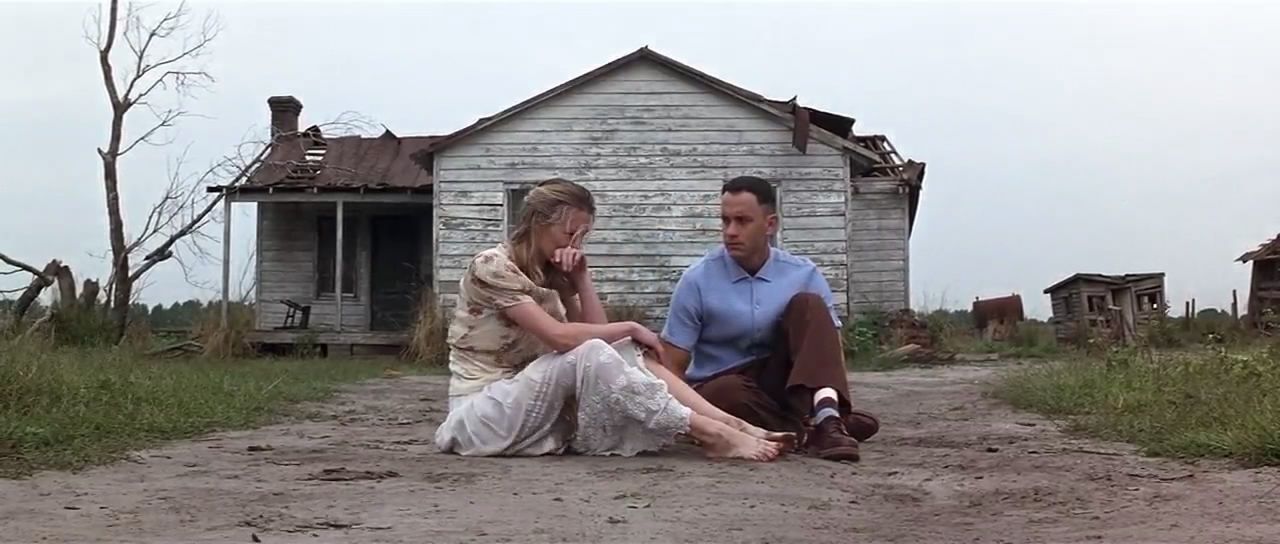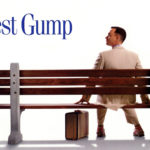Years ago I had a conversation with my best friend and his wife about Forrest Gump, which was of course the first movie for which Tom Hanks won Best Actor Oscar (the second being Philadelphia, back-to-back.) My friend’s wife voiced her opinion that it was warm, charming, funny and delightful. I replied that it was OK but that I didn’t especially like it, though if I were to rerun the conversation I would add that I admire it from a technical perspective, but as a film it still does not appeal to me.
But why would that be, I hear you ask. After all, FG is not without intelligence or narrative craft; the performances are noteworthy, the historical footage integrating Gump is every bit as effective as Woody Allen‘s Zelig achieved three years earlier; even the Library of Congress selected the film for preservation in the United States National Film Registry as being “culturally, historically, or aesthetically significant” in 2011.
Now I see with interest an article explaining “Why people hate Forrest Gump” – though hate is a very strong word and the reasons given are not all positive and supportable. I agree with 1-3 in that list (full article at the bottom), but not 4 or 5. You will notice that I’ve already given credit where credit is due, and as an honest film critic I certainly don’t condemn any film simply on the grounds that it is popular(ist) any more than I perversely praise films for eschewing popularity.
So here are a few reasons why Millward does not rate Forrest Gump, though you are quite at liberty to disagree – and I’m quite sure many will! I start by expanding on points 1-3 in the article reprinted below:
- The film is unquestionably flawed, some would say mediocre, and the character equally flawed as a dim-witted but savant everyman. One critic suggested “Forrest Gump’s dimness was a metaphor for glamorised nostalgia in that he represented a blank slate by which the Baby Boomer generation projected their memories of those events,” which might be seen ironically as a cynical device to entrance movie audiences. Either way, this is tripe – retrospectively imposing meaning where there is none.
- Mawkish sentimentality is the trademark of Hollywood Studios, and apparently loved in American culture. Yes, there are exceptions but saccharine sweetness that screams “love me, I’m cute” is desperately unappealing and still all too prevalent in the film industry. FG would have been so much better had the cloying sentimentality been balanced by a few sharp and sour notes – as we Brits usually offer to such great effect, plus greater ambiguity.
- The point about blatant Oscar-marketing is well made. This is not reasons to pursue a movie. In fact, the Oscars have much to answer for, frequently rewarding the wrong films and actors, and thereby playing into the hands of the Hollywood Studios. FG won 6 Oscars in 1995, including 3 of the top 4 (see here.) Did Robert Zemekis deserve best director over Krzysztof Kieślowski (Three Colours: Red) or Quentin Tarantino (Pulp Fiction), to name but two of the contenders? Many would argue not, but it is no surprise that the film awarded the Oscars is that most closely designed to appeal to the Academy.
- A phenomenon with which you will be familiar is how a film plays fast and loose with the raw material of the original novel, something that causes me to rant at fairly regular intervals. It’s unnecessary and does not improve the narrative. From Wikipedia:
- The film is based on the 1986 novel by Winston Groom. Both center (sic) on the character of Forrest Gump. However, the film primarily focuses on the first eleven chapters of the novel, before skipping ahead to the end of the novel with the founding of Bubba Gump Shrimp Co. and the meeting with Forrest, Jr. In addition to skipping some parts of the novel, the film adds several aspects to Gump’s life that do not occur in the novel, such as his needing leg braces as a child and his run across the United States. Gump’s core character and personality are also changed from the novel; among other things his film character is less of an autistic savant—in the novel, while playing football at the university, he fails craft and gym, but receives a perfect score in an advanced physics class he is enrolled in by his coach to satisfy his college requirements. The novel also features Gump as an astronaut, a professional wrestler, and a chess player.
- Further to point (1), one of the cleverer and funnier moments of the film is where Gump’s speech at the famous 1967 anti-war rally in Washington DC is drowned out by a sound system failure. However, this is also demonstrates the essential soft-heartedness of a movie desperately in need of greater edge. In short, it goes out of its way to avoid making political points, even as the hero meets then President Nixon, despite covering the main political events in that era.
- Ultimately, it fills with cod philosophy what is at heart a vacuous movie, the sort where you come out and wonder: “what the hell was that film trying to say?” Fact is that it exists not to provide anything meaningful at all – it is as wispy and insubstantial as candy floss: once consumed, it vanishes in a trice. It adds nothing to our collective knowledge or understanding, but pretends that it does. Yes, there are probably millions of romcoms out there that exist solely to attempt to entertain, but most of them have no pretensions to anything more.
All in all, I’m not saying I dislike Forrest Gump so much as saying there is nothing there to make me remember it with fondness, nor yet to watch it again. My complaint is that it was hugely overestimated and insubstantial and could, by common consensus, be a lot better.
There’s a movie called Forrest Gump. You’ve heard of it. And when you saw the headline of this article, you had one of two reactions:
“Yeah, why do people hate Forrest Gump now?” you thought, frowning at the seemingly impossible cynicism it must take to dislike this contemporary classic.
OR
“People hate it because it’s bad, duh,” you thought, rolling your eyes at the suggestion that this schmaltzy piece of garbage could ever be intelligently defended.
I’m not here to build up or tear down one side or the other. But isn’t it interesting how polarizing this film has become? There’s no middle ground. It was instantly beloved upon release, but it seems to be universally dismissed now. What’s changed in the twenty years since it came out? For starters, film culture has gone through some massive shake-ups, and certain ideologies pretty much reign supreme. When you get right down to it, there are five reasons why people in 2014 hate Forrest Gump:
1) “Well, I Never Liked It To Begin With”
We might as well get this one out of the way right off the top. Maybe you hated Forrest Gump from the moment you first saw it. Maybe you found its sickly-sweet tone patronizing. Maybe you found its American history travelogue construction contrived. Maybe you’re allergic to feathers. The fact is that there are plenty of perfectly valid reasons to dislike Forrest Gump, and there are plenty of people who would take issue with the suggestion that their opinion of the film was at all influenced by the general tenor of film discussion in the last decade. It’s not particularly interesting cinematically, and it’s not particularly stimulating intellectually. Forrest Gump is far from perfect, and it wasn’t universally acclaimed upon release.
2) The Appeal To Academy Authority
Forrest Gump wasn’t just financially and critically successful; it swept the Academy Awards that year, taking home Best Picture, Director, Actor, and Adapted Screenplay, among others. Unfortunately for the film, two of its fellow Best Picture nominees are arguably the most beloved films in internet history: Pulp Fiction and The Shawshank Redemption. For some reason, people are obsessed with the Oscars, and cries of “I can’t believe [Movie X] lost to [Movie Y]!!!” have echoed through the halls of IMDb (or its pre-internet equivalent, whatever that is) since time immemorial. Since 1994, Pulp Fiction has become a favorite of young cinephiles, and for good enough reason. It’s a decent entry point into independent cinema and non-traditional narrative structure. As for Shawshank, its easily digestible story and vague themes of “hope” have made it a hit with just about everyone who’s ever owned a television and a basic cable package. It infamously sits atop IMDb’s list of its 250 highest-rated movies to this very day. Forrest Gump is a softer, simpler film than either of these, so the notion that it could beat either of them for Best Picture is an infuriating one to many people. This isn’t even about Forrest Gump, really. It’s about people’s personal tastes not being validated by the Academy. Forrest Gump was just in the wrong place at the wrong time.
3) A Hatred of Sentimentality
“Feel-good” as a descriptor is repellant to so many film buffs. To be blunt, people take themselves too seriously. Any film that tries to make them feel happy is immediately dismissed as “cheesy” or “schmaltzy.” Film culture has become so cynical, and for some there’s an inherent assumption that movies have to be all “dark and gritty” to be worthwhile. This is nothing new, of course. To some degree, sentimentality has always been viewed as a little lowbrow. Really, it’s nothing more than typical high-horse snobbery. Feel-good movies are seen as “for the masses” and therefore “lowest common denominator” by default. Which leads us to…
4) Convenient Amnesia of the Film’s Better Elements
Maybe the question shouldn’t be “Why do people hate this movie now?” Maybe instead it should be “Why have people forgotten all the great things about this movie?” Any dismissal of Forrest Gump for its mawkishness also throws aside its trenchant political commentary. Think of the way this film depicts veterans. Isn’t Lieutenant Dan’s struggle with his disability so much more relevant today, given the recent scandals over the Department of Veterans Affairs’ failure to properly assist veterans? What about its subversively dark depiction of hippie culture? Is the film actually criticizing American culture by suggesting that so much of it came accidentally from a mentally disabled man? The film is ripe for discussion in many ways, so why do people act like it doesn’t have anything going on beneath the surface?
5) Sacrificing Sacred Cows
This is a big one, and it’s infected film culture for a while. Now, don’t think I’m disparaging any contrarian opinions. In fact, I value viewpoints that oppose my own. They force me to reconsider my own views, and obviously it’s never a good idea to ignore every idea you disagree with. That being said, attacking a film just because it’s popular is silly. It’s an admittedly attractive prospect. Contrarianism can make you feel smart, and there can be a thrill in going against the grain. And hey, if you’ve got a coherent, intelligent reason for not liking something, then by all means share it. A problem arises, though, when people diss beloved films just for the sake of dissing them. Forrest Gump is an easy target. It’s soft enough to be criticized as meaningless fluff, but since it’s not largely heralded for intellectual reasons one can get away with not having to back up that criticism.
This isn’t an article about Forrest Gump. It’s about how we treat films like Forrest Gump, these crowd-pleasing, tear-jerking audience favorites that have become easy to disparage and hard to legitimately praise. It’s Forrest Gump’s 20th anniversary this week. Whatever your feelings on it, it’s due to be revisited. When you watch it this time, put aside what it means to other people. Think about what it means to you. That’s the only thing that should matter.













